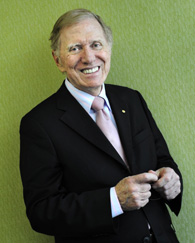The 72-year-old retired from the bench two years ago as Australia's longest serving judge and is a pioneering AIDS activist since the 80s, international advocate for human rights, and outspoken critic of the British colonial era laws that continue to criminalise homosexuality in many Commonwealth countries.

Michael Kirby came out in 1999 when he named his longterm partner, Johan van Vloten, in his listing in “Who’s Who in Australia”. The couple met in 1969 in a gay bar in Sydney, but it was a love that was – in Kirby's own words – "hidden away for a quarter of a century". He recounted that year after year his partner would prepare everything at Christmas parties and literally disappear until the last guest left the apartment. The couple live in Sydney.
In a wide-ranging interview with ABC's Lateline on Sep 28, Kirby spoke about having to keep his relationship under wraps as it was expected of him in order to rise to the highest levels of the legal benches, the parallels between the acceptance of gay people and Asian Australians by society.
"Well, he – that was the rule. You – and everybody knew the rule and many people - I mean, you can't live in the suburbs of Sydney for 30 years and 40 years – 42 years as we've now been, without people knowing about it, but everyone knew the rules," he said.
"You didn't reveal it, you didn't force it on people and as long as you kept quiet, then that was something that was tolerated. But toleration is a very condescending emotion and toleration's over as far as I'm concerned.
"What is now the obligation of Australia is to face up to this reality of fellow citizens, fellow human beings living in our society, pushing the trolleys at supermarkets, paying their taxes and demanding equal respect and equal dignity and equal rights – equal legal rights."
He continued: "You had to pretend that you were something other than you are, and I'm afraid to say that there are some people in religious organisations in our country who still wish we went back to that and there are quite decent citizens who think that.
"It's alright – we know – people have written to me and said to me, 'We know there are gays out there, but we don't want to have it forced on us.' And unfortunately, that was the attitude we had in white Australia to Aboriginal Australians and to Asian Australians, and the way we overcame it was we began to get Asian Australians as neighbours, we began to know them as friends, as colleagues and find that they had all the varieties of human existence, and this is the same with gay people.
"They're not all hairdressers, they're everywhere, they're on the High Court of Australia and in other places of importance and that's just how it is and people have got to get to terms with it and get over it."
Asked what led to Kirby deciding to come out, he said: "Well, the turning point really was the AIDS epidemic. I mean, round about 1984-'5, my friends, close friends of Johan and myself began to die and I used to go to funerals. And you'd see on one side of the church the gay family of the deceased and on the other side the blood family and never the twain met.
"And I became involved in some of the national bodies and international bodies, and you then realised that in comparison with the enormity of this epidemic, your own private life was really an insignificant thing and that you had to see that in the context of millions of people - not only gay people, but millions of people dying of an unexpected scourge. So that really was the turning point.
"We've made enormous strides on this issue, but we're still really holding back from some areas, some developments that accord full equality to gay citizens, and that is not worthy of a wonderful country like Australia.
"People of all minorities should have full dignity and full rights, not just in money things, but in the dignity of their relationships and in respect for them as citizens, of fellow citizens. And of course, as I've said, young people really don't have a problem here, but there are a few older types that really need to read my book and then I think they might see it from another point of view, they might learn what it's like to wear other shoes."
The transcript and 16-min video can be viewed here.
Kirby on marriage: A bit late for him to take the plunge but "important thing for young people"
In a recent interview with the Australian Associated Press (AAP), Kirby says Australia has to "catch up with the last decade of the 20th century" and he believes Australia will legalise same-sex marriage soon, though it may be a bit late for him to take the plunge.
"After 42 years it's getting a bit late in our engagement for us to suddenly take the plunge," he said. "But it is an important thing for young people to have an affirmation, an occasion."
Referring to the Howard and Rudd governments for refusing to allow civil partnerships, he said: "That is now not acceptable to people, that is second class citizenship."
"The time has come to give full equality to all people, straight and gay, who want to have a marriage or to have some other association, a de facto relationship."
